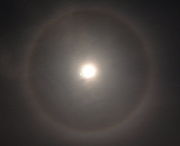 From the National Geographic Magazine:
From the National Geographic Magazine:We sleep 1.5 hour less a night than we did just 100 years ago
We fight these forces at our peril. Harvard's researchers note that going without sleep for 24 hours or getting only 5 hours of sleep a night for a week is the equivalent of a blood alcohol level of 0.1 percent. Yet modern business ethic celebrates such feats. "We would never say, 'This person is a great worker! He's drunk all the time!' "
A 2004 study included 2,700 first-year medical residents. These young men and women worked shifts that were as long as 30 hours twice a week. The research revealed the remarkable public health risk that this sleep debt entailed. "We know that one out of five first-year residents admits to making a fatigue-related mistake that resulted in injury to a patient. One in 20 admits to making a fatigue-related mistake that resulted in the death of a patient. One day people will look back on what will be viewed as a barbarous practice."
We sleep on average 1.5 hour less a night than we did just a century ago. Some of our epidemic of insomnia or sleeplessness is probably just our refusal to pay attention to our biology. The natural sleep rhythms of teenagers would call for a late morning wake-up—but there they are, starting high school at 8 a.m.
The night shift worker sleeping in the morning is fighting ancient rhythms in his or her body that order him or her awake to hunt or forage when the sky is flooded with light. Yet he or she has no choice.
We fight these forces at our peril. Harvard's researchers note that going without sleep for 24 hours or getting only 5 hours of sleep a night for a week is the equivalent of a blood alcohol level of 0.1 percent. Yet modern business ethic celebrates such feats. "We would never say, 'This person is a great worker! He's drunk all the time!' "
One in 20 medical residents admits to making a fatigue-related mistake that resulted in the death of a patient
A 2004 study included 2,700 first-year medical residents. These young men and women worked shifts that were as long as 30 hours twice a week. The research revealed the remarkable public health risk that this sleep debt entailed. "We know that one out of five first-year residents admits to making a fatigue-related mistake that resulted in injury to a patient. One in 20 admits to making a fatigue-related mistake that resulted in the death of a patient. One day people will look back on what will be viewed as a barbarous practice."
References:
The Secrets of Sleep. National Geographic Magazine, 2011.
Image source: A halo around the Moon. Wikipedia, GNU Free Documentation License.